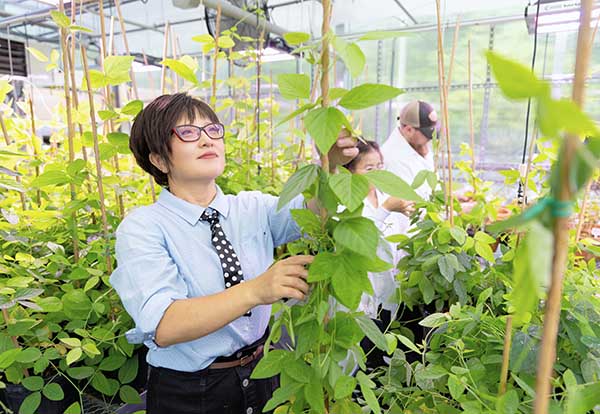
With a $2.8 million grant from the National Science Foundation, Bao-Hua Song aims to achieve two goals: develop new soybean varieties diverse enough to resist the world’s most damaging soybean pest and advance UNC Charlotte as a leader in plant science.
Soybean cyst nematode, a plant-parasitic roundworm that targets the roots of soybean and other legume plants, ravages soybean crops across the United States at a rate that surpasses the annual yield loss from the next five most-damaging soybean pathogens combined. Annual losses nationwide due to SCN alone equal up to $1.5 billion.
“High levels of crop losses have implications not only for farm viability but for worldwide food production,” said Song, a professor of biological sciences whose research encompasses understanding the molecular basis and evolution of complex trait variations significant to agriculture, human health and climate adaptation. “The most efficient and environmentally friendly approach to mitigating SCN damage is to develop and deploy new soybean varieties that can withstand it.”
To keep pace with rapidly evolving SCN populations — and because current resistant soybean varieties are becoming less so — Song and her colleagues plan to apply her lab’s characteristic and reliable approach to reaching solutions: use crop wild relatives as study systems as they identify new genetic resources (with broad SCN resistance) and their underlying molecular mechanisms.
“We know that the wild soybean Glycine soja, for example, possesses genomic diversity that holds untapped genetic resources for identifying novel SCN-resistant genotypes,” said Song. “This will remain important as we move forward with developing new soybean varieties.”
Research, teaching, career growth
While the overarching goal for Song and co-principal investigators, Mukhtar Shahid, University of Alabama at Birmingham, and Chen Sixue, University of Mississippi, is to uncover molecular bases of broad resistance of wild soybeans to SCN, Song’s research grant, which is part of the NSF’s Plant Genome Research Program, also includes support for expanding the level of computational expertise in the field of plant science.
To grow the number of scientists and educators qualified to work in and teach systems biology — the computational and mathematical analysis and modeling of complex biological systems — Song will collaborate with Charlotte Teachers Institute to develop ways to provide hands-on education and training to undergraduate and graduate students and high school science teachers. Among these are the development of a new course in systems biology and a number of workshops and seminars and symposia accessible to scientists and teachers.
Of particular significance to Song is the opportunity it offers to intentionally enhance her research and advance her career trajectory.
“The NSF recognizes that mid-career scientists benefit from support that allows them to secure research time,” she said. “Support of this kind affirms my desire and potential to become an international leader and teacher-scholar as UNC Charlotte moves to the forefront of this exciting field.”